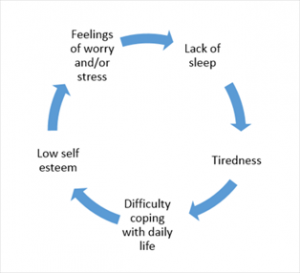Sleep
Sleep can cause mental health problems, and mental health problems can cause sleep disturbances; reading this highlights a vicious circle and that the need for us to self-care couldn’t be clearer.
Benefits of quality sleep:
Improved daily functioning
Emotional resilience
Memory retention
Physical and mental health
Impact of poor-quality sleep:
A negative bias on events throughout the day
Feeling vulnerable and emotional
Irrational thoughts
Short-tempered
Falling asleep during the day
Low immunity
The effects on mental health:
Quiet sleep induces the muscles to relax, breathing rates to slow and our body temperature to drop. In deep, quiet sleep the immune system is also strengthen by biological changes that occur in this state.
In REM/ rapid eye movement sleep, we dream; this is where our biology reverts back to levels of when we are fully awake; it is thought this stage of sleep improves memory, emotional well-being and assists with learning mechanisms.
By looking at how these two types of sleep affect us, it is easier to understand why thinking can be come impaired, memory is difficult to retrieve, why stress levels increase and why overall functioning becomes problematic if sleep deprivation is suffered long-term.
Produced by Mind to illustrate the point:

I’ve seen drastic changes in clients when quality sleep has been achieved, to the point of them almost presenting as a different personality before me. So, I have witnessed first-hand how detrimental a lack of sleep can be and also how transformation obtaining quality sleep can be to a person.
Disturbances to our natural sleep cycles are normal reactions to daily life. We are busy and live in an on-demand society where worries are common place. When you find your disturbances are going beyond a few days, a few weeks and start to approach months of little to no sleep, continual broken sleep or excessive sleep then it is time to acknowledge that you may need some help in addressing this.
Mental health and sleep
Particular mental health issues can impact negatively on sleep:
- Depression: can cause too little or too much sleep, often concerned with worries and a busy mind, or feeling so tired that you can easily sleep through a day but struggle at night time.
- PTSD: flashbacks, intrusive thoughts and intrusive images can prevent sleep or manifest in dreams, causing the person to either want to sleep to avoid them or being too scared to sleep because of them.
- Anxiety: negative thoughts can become overwhelming if you tend to get involved in following them and indulge in them- it is easily done and can lead to the person catastrophising events and thoughts which can cause fear and increase the overwhelming nature of the thoughts. If we become worked up and hyper alert then sleep can seem impossible despite being exhausted.
Creating a helpful and healthy bedtime routine:
- Try to avoid or limit alcohol 4 hours before you would normally go to bed to sleep;
- Finish chores or irritating jobs a few hours before bedtime, to allow your mind to disconnect from things left on the to-do list;
- Allow yourself some ‘me time;’
- Exercise after work, this can be a short 20-minute walk round the block, a 10- minute streamed or DVD work-out or a full hour at the gym- whatever you have time for, but exercise can boost mental health and assist sleep;
- Create a relaxing atmosphere and beneficial habits:
- this can include making sure that your bedroom is tidy so that you have a safe and uncluttered place in your house,
- have the room at to your chosen temperature,
- clean sheets,
- having a book ready to read whilst in bed,
- Using a scented pillow spray or reed diffuser in your room,
- Light candles if you like them,
- Quit looking at social media after 6 pm each evening, or uninstall it for a week and monitor the impact on your mood,
- Say No to things you don’t want or need to do,
- Take a long bath or shower,
- Turn your phone to ‘do not disturb’ mode or turn it off completely,
- Meditate,
- Journal about your day- making sure to include anything that you are grateful for as your ending paragraph,
- Mind-map current worries and look at evidence for your thoughts, then the lack of evidence and then provide yourself with a balanced viewpoint- this can take the emotionality away from things that are bothering you and help you to rationalise,
- Stick to a regular bedtime,
- Stick to a regular wake up time that allows you to sleep long enough but one that does not induce rushing around or stress in the morning- find a balance that suits you.
I can hear busy parents, workers and students shouting at the screen saying how idyllic all the above sounds, along with those with mental health concerns also shouting that they don’t have the motivation to carry all these things out; these are suggestions and by no means is it an order that you carry all these out to the letter.
I’m asking you to make a small change to your routine and to your perception of yourself. Value yourself enough to make some time for yourself and pick ONE thing to change. If you like it then in time you can add another from the list. It’s trial and error until you find a routine that serves you well. The remaining option is to continue with sleep affecting your functioning or your mental health concern to continue to affect your sleep. Sometimes medication is not the answer and there are simple changes, like those above, that we can make to feel better about ourselves over time. We often forget that we are our own expert and we know what fits us best; by changing one thing today you can start to feel in control of something that feels out of control. So, I urge you to take charge and make a new positive habit to help yourself; habits don’t require motivation once they have been formed so how empowering would it be to know that you can take care of yourself without needing to feel motivated to do so?
…I’ll leave you with that thought.

Add Comment